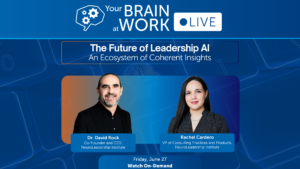In 2004, Pamela Smith, now an associate professor of management at the University of California, San Diego, happened upon a clue into what power does to the brain. She was having coffee with a friend who had just changed jobs, going from one advertising firm to another. With that, she moved from frontline work to a management gig overseeing four people—and as if by magic, things in her head started changing.
“It’s like I have to think differently, to use a different part of my brain, now that I’m a supervisor,” Smith recalls her friend saying in what’s now a highly cited 2006 Journal of Personality and Social Psychologypaper. “It’s nice because now everything has more purpose. I’m thinking about the agency’s 5-year plan, not just what I need to do to get through the week. But I feel so removed from what’s going on in the office. I give my employees tasks, and they complete them. I just have no idea how they do it—and I used to have their job!”
Spurred on by this tip, Smith led the Journal of Personality and Social Psychology study. In seven experiments, she and her collaborator showed a range of ways that people made to feel powerful—like by writing about times in life where they felt in control of a situation—think differently than their low-power peers. Is a purse an item of clothing? It is if you’re powerful.
In study after study, Smith and researchers like her started piecing together evidence for the profound ways that holding power—whether through experimental manipulation or real-life experience—changes the way people process their worlds, in ways that explain not only corporate greed or erratic executive behavior, but sexual harassment.
Power is nonconscious, Smith and her colleagues have found; we can have power, and absorb its cognitive effects, without realizing that we’re doing so. Other researchers have found that powerful people consider others’ perspectives less, and that the experience of power increases optimism about risky decisions. It also gives people an “illusory” sense of control over what will happen, increases the anticipation of reward while reducing the perception of threat, and prompts people to perceive sexual interest that isn’t there, among other effects.
While we don’t have all the answers, we have started organizing the literature on power and found four major ways that its cognitive effects explain harassment. These categories may provide a better conceptual framework than we have today for understanding what power does to people, how to maximize its positive qualities, and how to curb its dangers, especially in terms of sexual misconduct. This is a crucial step, as sexual harassment training has received such shockingly little research, while sexual misconduct itself dominates the cultural conversation as 2018 begins.
The first thing to know: Power blinds you to others’ perspectives
In the 1960s, sociologists—like novelists and political theorists before them—described how not having power requires you have to think more about what’s going on inside the minds of the powerful than they ever would of you. Since the less powerful depend on the powerful to feed and clothe themselves, their habits of mind are going to be different. You’re going to ruminate more on what your boss thinks of you than she would in the opposite direction, just as a court has no choice but to try and infer the whims of a king.
That shows itself on tests of empathy—powerful people feel less distressed when someone sitting across from them tells a story of great personal hardship—and perspective taking, where high-power people are less likely to realize that others don’t share their same privileged knowledge about things—suggesting they anchor too much on their own experience. While there is relatively little research on perspective taking and harassment, one 2008 study of nearly 500 participants did find links. The participants, recruited via newspaper flyers and the like, watched videos of actors playing out situation pulled from major harassment cases. Both men and women higher in perspective-taking were likely to rate the sexualized behavior as unwelcome.
The interaction of power and perspective taking also has implications for how organizations treat harassment claims. Powerful people are likely to take cynical views of others motivations. “It is interesting to see how some people have reacted to sexual harassment allegation, with the claims that this person is making a claim of sexual harassment because they’re out to get something,” Smith, the UCSD researcher, says. “Is that an extension of some of the cynicism that comes from having power?”
In organizations, cynicism from leadership regarding sexual misconduct can lead to what clinical psychologists refer to as “institutional betrayal”—where the trauma of an assault is compounded by bureaucratic incompetence or opposition or indifference from management. (In a 2013 study, just under half of college women with a history of sexual assault felt betrayed by their schools.) The opposite of institutional betrayal is institutional courage, where bureaucracy is minimized and victims stories are believed—whether it’s on campus or in a corporation.
Power turns people into abstract thinkers
At the close of Smith’s formative 2006 paper, she and her co-author proposed an abstraction hypothesis. “We propose that … those with power tend to process information in a more abstract manner than those without power,” they wrote. “The ability to see the bigger picture, to plan ahead, to keep an eye on higher goals, may be prerequisites for obtaining power as well as requirements for maintaining it.” In subsequent studies, she found that abstract thinking increases your own personal sense of power, and that just using more abstract, rather than concrete, language makes people appear more powerful. Other researchers found that when experimental participants were asked to think about their lives in a year, they used more abstract thinking in an unrelated follow up task than those who mused about tomorrow—suggesting that abstract thinking in one thing you’re doing can bleed into the next.
While abstract thinking sounds innocent, it too has implications for harassment. Researchers have identified a gap in how people describe their sexual experiences: men will self-report more coercive sexual behaviors when presented with more concrete survey items (“Have you ever coerced somebody to intercourse by holding them down?”) versus abstract ones (“Have you ever raped somebody?”). Women will also report greater victimization when given concrete, versus abstract, survey items. Relatedly, men are more likely to interpret vignettes of sexual harassment positively than women looking at the same prompts.
Per Orwell, the way to address these overlapping patterns—that people with power think abstractly, and abstraction lets toxic behavior more easily slide by, even in the minds of offender and victim—is to get concrete about what sexual misconduct is and isn’t. Yale did this with the release of their Sexual Misconduct Scenarios in 2013, which give specific examples (“it will be okay just this once”) and punishments (“in the range of probation to suspension.”) While Yale doesn’t have efficacy data on the scenarios as intervention, the sexual misconduct team there told us in an email interview that they have been helpful for making the schools “community aware of the range of behaviors that characterize ‘nonconsensual sex.’” And yet new reports indicate that Yale may still have a long way to go in addressing harassment.
Power leads to unrealistic optimism about goals
In addition to increased optimism, “illusory” control, and extra sensitivity to reward, powerful people also have a tougher time remembering—or even imagining—things that could get in the way of goals.
In a 2013 paper, Magee and his colleagues manipulated undergrads to feel either high- or low-powered, then asked them to remember statements around two separate quests—either traveling to the Amazon rainforest or opening a flower shop. Some statements were about things that got in the way of their goals (“You are afraid of some of the native animals”) while others that facilitated things (“You have prior experience visiting jungles.”) After doing an unrelated task, participants were asked to remember as many statements as possible. As expected, the high-power group had a much harder time remembering any statements about things that got in the way of their travel or business plans than low-power participants.
Given that lack of risk sensitivity, organizations need to spell out the stakes of what’s to be lost with harassment. Linking behavior to outcome—like Yale did with their scenarios—is a start. The high-powered exits brought about by #MeToo, like Matt Lauer’s reportedly$20 million a year salary, signal to individuals and organizations just what the stakes are. When the risks are tied to bank accounts and budgets, powerful people are more inclined to listen.
And perhaps most importantly, power leads to people seeing the world in terms of goals
In the management thought leader scene, “leaders think in goals” is well-worn to the point of cliché. But the empirical research reveals that this happens at a granular, moment-by-moment, perceptual level. “In organizations, the more power you have, the bigger picture you’re supposed to have,” Smith says. “It’s literally your job: how these departments fit together, your five year plan. And that becomes imbued in the way people think about things in general.” Whether this is healthy or toxic depends on the goals people have.
In experiments, Magee has found that when experiment participantsare made to feel powerful, they’re more likely to describe a professional relationship with a peer in how its useful to them.
“Power leads people to objectify other people, see them in instrumental terms, how they might help fulfill goals,” he says, and that process “can manifest itself as sexual objectification if someone has a sexualized goal.” Smith echoes the sentiment: “If we hire men whose primary way of looking at women is in terms of sexual goals, and power makes you goal oriented, you can guess what happens next.” Indeed, research has found that sexually aggressive men rate women as significantly more attractive when they’ve been primed to feel powerful, and that power priming is also linked with hostile sexism and gender harassment.
In another experiment, Magee and his colleagues asked male college students to select a partner for an analytical task. After being primed to feel high or low power, some were primed to have sexual goals by doing a word search with lots of sexual terms (“bed,” “skin,” and “feel”) while others had neutral terms (“clock,” “bread,” and “radio”). They were then shown the resume and photo of a young woman rated in pilot data to be moderately competent but highly attractive, and asked if they’d like to work together with her. The result: When high-powered men’s sexual goals were primed, they were more likely to want to work with her, moreso than the low-power participants.
This doesn’t just happen in terms in sex: Power exaggerates the roles of goals in people’s lives, and turns down the volume on inhibition, to the point that you might take more candy from a jar marked for children, as happened in one brutally symbolic experiment. Power means that your personal goals trump social norms in terms of personal importance, which helps explain why employees at a major bank like Wells Fargo might make sham accounts to meet sales objectives.
But this doesn’t all have to be so bleak, Smith says: if a powerful person’s goals are prosocial—if they want to help their employees grow and benefit customers—then that will be magnified with the embrace of power. That’s why motivations for power are so important, especially in terms of promotions and succession planning: if people have self-serving drives, they’ll make antisocial decisions, and if they want to help others, they’ll act in that accordance with that urge, too. To update a phrase, power doesn’t corrupt—it amplifies goals, whether they’re sexual, financial, or social. Good goals become great goals, bad goals become toxic goals.
The NeuroLeadership Institute is a place where brain science PhDs collaborate with business execs to solve organizational problems.
SEE ALSO: Three Types of Work Culture and How to Hire for Each of Them






